阅读教程翻译
- 格式:docx
- 大小:27.89 KB
- 文档页数:10
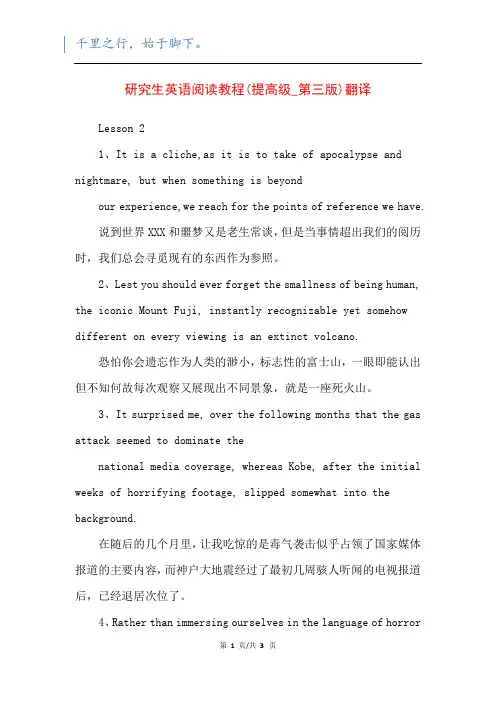
研究生英语阅读教程(提高级_第三版)翻译Lesson 21、It is a cliche,as it is to take of apocalypse and nightmare, but when something is beyondour experience,we reach for the points of reference we have.说到世界XXX和噩梦又是老生常谈,但是当事情超出我们的阅历时,我们总会寻觅现有的东西作为参照。
2、Lest you should ever forget the smallness of being human, the iconic Mount Fuji, instantly recognizable yet somehow different on every viewing is an extinct volcano.恐怕你会遗忘作为人类的渺小,标志性的富士山,一眼即能认出但不知何故每次观察又展现出不同景象,就是一座死火山。
3、It surprised me, over the following months that the gas attack seemed to dominate thenational media coverage, whereas Kobe, after the initial weeks of horrifying footage, slipped somewhat into the background.在随后的几个月里,让我吃惊的是毒气袭击似乎占领了国家媒体报道的主要内容,而神户大地震经过了最初几周骇人听闻的电视报道后,已经退居次位了。
4、Rather than immersing ourselves in the language of horrorfilms and the end of the world,when the time is right to try to glimpse this new territory, we might for thought reach fora book by Japan’s most popular contemporary novelist.我们不能沉醉在XXX片和世界XXX的语言中,在合适的时光,假如想要了解这一新的领域,我们可以考虑看看XXX最流行的现代小说家的一本书。
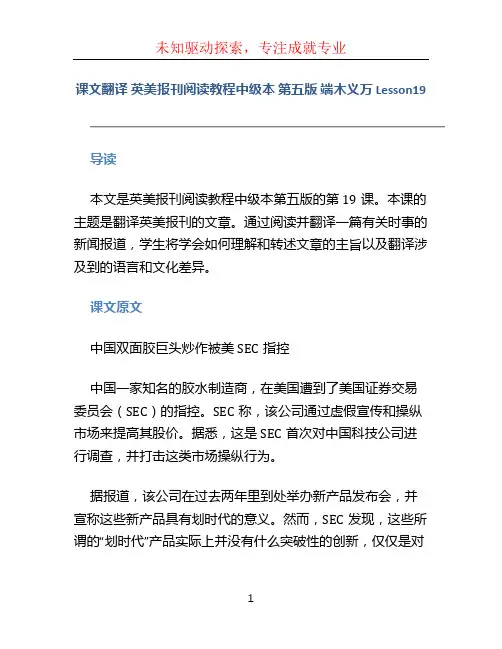
课文翻译英美报刊阅读教程中级本第五版端木义万 Lesson19导读本文是英美报刊阅读教程中级本第五版的第19课。
本课的主题是翻译英美报刊的文章。
通过阅读并翻译一篇有关时事的新闻报道,学生将学会如何理解和转述文章的主旨以及翻译涉及到的语言和文化差异。
课文原文中国双面胶巨头炒作被美SEC指控中国一家知名的胶水制造商,在美国遭到了美国证券交易委员会(SEC)的指控。
SEC称,该公司通过虚假宣传和操纵市场来提高其股价。
据悉,这是SEC首次对中国科技公司进行调查,并打击这类市场操纵行为。
据报道,该公司在过去两年里到处举办新产品发布会,并宣称这些新产品具有划时代的意义。
然而,SEC发现,这些所谓的“划时代”产品实际上并没有什么突破性的创新,仅仅是对已有产品的改进。
而且,该公司还通过在社交媒体上刷存在感,夸大了产品的价值和市场前景。
SEC发言人表示,这起指控意在提醒投资者要警惕那些通过虚假宣传来推高股价的公司。
SEC将继续调查并采取行动以保护公众利益和市场的稳定。
另外,该公司可能面临来自投资者的集体诉讼。
一些投资者表示,他们在该公司的股票上损失惨重,而且曾经相信该公司的虚假宣传。
如果诉讼成功,这家公司可能需要支付巨额的赔偿费用。
这起事件引发了投资者对于中国科技公司的信任危机。
许多投资者表示,他们将对中国科技公司保持谨慎态度,并增加对于其财务状况和商业行为的审查力度。
课文翻译中国双面胶巨头炒作被美SEC指控中国一家知名的胶水制造商,在美国遭到了美国证券交易委员会(SEC)的指控。
SEC称,该公司通过虚假宣传和操纵市场来提高其股价。
据悉,这是SEC首次对中国科技公司进行调查,并打击这类市场操纵行为。
中国一家知名的胶水制造商被美国证券交易委员会(SEC)指控,称其通过虚假宣传和操纵市场提高股价。
这是SEC首次调查中国科技公司并打击市场操纵行为。
据报道,该公司在过去两年里到处举办新产品发布会,并宣称这些新产品具有划时代的意义。
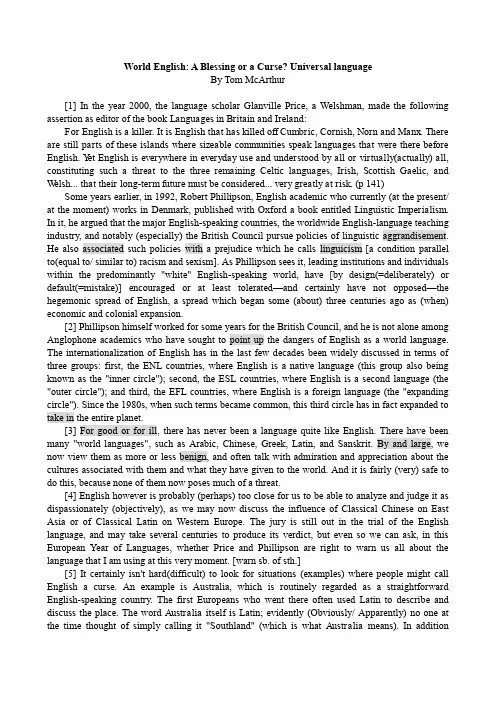
World English: A Blessing or a Curse? Universal languageBy Tom McArthur[1] In the year 2000, the language scholar Glanville Price, a Welshman, made the following assertion as editor of the book Languages in Britain and Ireland:For English is a killer. It is English that has killed off Cumbric, Cornish, Norn and Manx. There are still parts of these islands where sizeable communities speak languages that were there before English. Yet English is everywhere in everyday use and understood by all or virtually(actually) all, constituting such a threat to the three remaining Celtic languages, Irish, Scottish Gaelic, and Welsh... that their long-term future must be considered... very greatly at risk. (p 141) Some years earlier, in 1992, Robert Phillipson, English academic who currently (at the present/ at the moment) works in Denmark, published with Oxford a book entitled Linguistic Imperialism. In it, he argued that the major English-speaking countries, the worldwide English-language teaching industry, and notably (especially) the British Council pursue policies of linguistic aggrandisement. He also associated such policies with a prejudice which he calls linguicism[a condition parallel to(equal to/ similar to) racism and sexism]. As Phillipson sees it, leading institutions and individuals within the predominantly "white" English-speaking world, have [by design(=deliberately) or default(=mistake)] encouraged or at least tolerated—and certainly have not opposed—the hegemonic spread of English, a spread which began some (about) three centuries ago as (when) economic and colonial expansion.[2] Phillipson himself worked for some years for the British Council, and he is not alone among Anglophone academics who have sought to point up the dangers of English as a world language. The internationalization of English has in the last few decades been widely discussed in terms of three groups: first, the ENL countries, where English is a native language (this group also being known as the "inner circle"); second, the ESL countries, where English is a second language (the "outer circle"); and third, the EFL countries, where English is a foreign language (the "expanding circle"). Since the 1980s, when such terms became common, this third circle has in fact expanded to take in the entire planet.[3] For good or for ill, there has never been a language quite like English. There have been many "world languages", such as Arabic, Chinese, Greek, Latin, and Sanskrit. By and large, we now view them as more or less benign, and often talk with admiration and appreciation about the cultures associated with them and what they have given to the world. And it is fairly (very) safe to do this, because none of them now poses much of a threat.[4] English however is probably (perhaps) too close for us to be able to analyze and judge it as dispassionately (objectively), as we may now discuss the influence of Classical Chinese on East Asia or of Classical Latin on Western Europe. The jury is still out in the trial of the English language, and may take several centuries to produce its verdict, but even so we can ask, in this European Year of Languages, whether Price and Phillipson are right to warn us all about the language that I am using at this very moment. [warn sb. of sth.][5] It certainly isn't hard(difficult) to look for situations (examples) where people might call English a curse. An example is Australia, which is routinely regarded as a straightforward English-speaking country. The first Europeans who went there often used Latin to describe and discuss the place. The word Australia itself is Latin; evidently (Obviously/ Apparently) no one at the time thought of simply calling it "Southland" (which is what Australia means). In addition(besides), in South Australia there is a wide stretch of land called the Nullarbor Plains, the first word of which sounds Aboriginal, but nullarbor is Latin and means "no trees". And most significantly of all, the early settlers called the continent a terra nullius. According to the Encarta World English Dictionary (1999) the Latin phrase terra nullius means:... the idea and legal concept that when the first Europeans arrived in Australia the land was owned by no one and therefore open to settlement. It has been judged not to be legally valid.But that judgment was made only recently. When the Europeans arrived, Australia was thinly populated—but populated nonetheless (from then on)—from coast to coast in every direction. There were hundreds of communities and languages. Many of these languages have died out, many more are in the process of dying out, and these dead and dying languages have been largely replaced (substituted) by either kinds of pidgin English or general Australian English. Depending on your point of view, this is either a tragic loss or the price of progress.[6] At the same time, however, can the blame for the extinction of Aboriginal languages be laid specifically at the door of English? The first Europeans to discover Australia were Dutch, and their language might have become the language of colonization and settlement. Any settler language could have had the same effect. If for example the Mongols had sustained their vast Eurasian empire, Mongolian might have become a world language and gone to Australia. Again, if history had been somewhat (a little) different, today's world language might have been Arabic, a powerful language in West Asia and North Africa that currently affects many smaller languages, including Coptic and Berber. Spanish has adversely (negatively) affected indigenous languages in so-called "Latin" America, and Russian has spread from Europe to the Siberian Pacific. If English is a curse and a killer, it may only be so in the sense (meaning) that any large language is likely (possible) to influence and endanger smaller languages.[7] Yet many people see (consider/ regard) English as a blessing. Let me leave aside here the obvious advantages possessed by any world language, such as a large communicative network, a strong literary and media complex (network), and a powerful cultural and educational apparatus (organization). Let us instead look at something rather different: the issue (problem) of politics, justice, and equality. My object (target) lesson this time is South Africa. Ten years ago, South Africa ceased (stopped) to be governed on principles of racial separateness, a system known in Afrikaans (a language derived from Dutch) as apartheid. The system arose (occurred) because the Afrikaner community—European settlers of mainly Dutch descent—saw themselves as superior to the indigenous (native) people of the land they had colonized.[8] English-speaking South Africans of British descent were not particularly strong in opposing the apartheid regime (rule), and the black opposition, whose members had many languages, was at first weak and disorganized. However, the language through which this opposition gained (obtained/ got) strength and organization was English, which became for them the key language of freedom and unity, not of oppression. There are today eleven official languages in South Africa—English, Afrikaans, and nine vernacular languages that include Zulu, Ndebele, and Setswana. But which of these nine do black South Africans use (or plan to use) as their national lingua franca? Which do they wish their children to speak and write successfully (in addition to their mother tongues)? The answer is none of the above. They want English, and in particular (especially/ specifically) they want a suitably Africanized English.[9] So, a curse for the indigenous peoples of Australia and something of a blessing for those in South Africa...[10] How then should we think of English in our globalizing world with its endangered diversities? The answer, it seems to me, is crystal clear. Like many things, English is at times (often) a blessing and at times a curse—for individuals, for communities (society), for nations, and even for unions of nations. The East Asian symbolism of yin and yang might serve (illustrate) well here: There is something of yang in every yin, of yin in every yang. Although they are opposites, they belong together: in this instance (case) within the circle of communication. Such symbolism suggests (shows) that the users of the world's lingua franca should seek to benefit as fully as possible from the blessing and as far as possible avoid invoking the curse. (1, 292 words)ABOUT THE AUTHORDr. Tom McArthur is founder editor of the Oxford Companion to the English Language (1992) and the quarterly English Today: The International Review of the English Language (Cambridge, 1985—). His more than 20 published works include the Longman Lexicon of Contemporary English (1981), Worlds of Reference: Language, Lexicography and Learning from the Clay Tablet to the Computer (1986), and The English Languages (1998). He is currently Deputy Director of the Dictionary Research Center at the University of Exeter.EXERCISESI. Reading ComprehensionAnswer the following questions or complete the, following statements.1. It can be inferred from Glanville Price's statement that he is ______.A. happy that English is everywhere in Britain and IrelandB. worried about the future of the remaining Celtic languagesC. shocked by the diversity of languages in Britain and IrelandD. amazed that many people in the UK still speak their Aboriginal languages2. Cumbric is used as an example of ______.A. a local dialectB. a victim of the English languageC. a language that is on the verge of extinctionD. a language that is used by only a limited number of people3. Which of the following is the major concern of the book Linguistic Imperialism?A. English teaching overseas.B. British government's language policies.C. Dominance of English over other languages.D. The role of English in technology advancement.4. Both Price and Phillipson are ______.A. government officialsB. advocates of linguistic imperialismC. in support of language policies carried out by the British CouncilD. concerned about the negative effect of English on smaller languages5. According to the text, the EFL countries ______.A. are large in numberB. is known as the "outer circle"C. will be endangered by EnglishD. have made English their official language6. According to McArthur, Chinese is different from English in that ______.A. it has made a great contribution to the worldB. it has had positive influence on other languagesC. it may result in the disappearance of other languagesD. it probably will not endanger the existence of other languages7. When he said the jury is out in the trial" (Line 3, Paragraph 4), McArthur meant ______.A. punishment is dueB. the jury is waiting for a trialC. no decision has been made yetD. there is no one to make the decision8. Australia might be used as an example to show that ______.A. languages are changing all the timeB. some English words are derived from LatinC. English has promoted the progress of some nationsD. English should be blamed for the extinction of smaller languages9. Many people see English as a blessing for people in ______.A. AustraliaB. East AsiaC. South AfricaD. ESL countries10. The main theme of this speech is that ______.A. English should be taught worldwideB. English as a world language does more harm than goodC. we should be objective to the internationalization of EnglishD. we should be aware of (realize) the danger of English as a world languageB. Questions on global understanding and logical structures1. Why does McArthur introduce Glanville Price and Robert Phillipson's points of view on the spread of English? What is his? Intention?McArthur quotes Price’s assertion and cites Pillipson’s viewpoint on the spread of English as sort of cons to initiate his argument. Cons are usually popularly believed arguments or opinions that are against the author’s point of view. Cons are c ommonly used writing techniques and are often employed in order to appeal the audience and highlight the author’sviewpoint.2. Does McArthur agree with what Price and Phillipson argued? From as early as which section does McArthur show his attitude? Toward the dominance of English as a world English?No. McArthur’s opinion is different from Price and Pillipson’s arguments. He doesn’t believe that English is a killer and should be blamed for the extinction of smaller languages. He sees English as both a blessing and a curse, maybe as a blessing more than a curse. After introducing Price and Pillipson’s viewpoints, McArthur writes about his own ideas on the issue of English as a world language. From the sentence “For good or for ill, there has never been a language quite like English”, we can learn that McArthur does not curse English like Price and Pillipson and he has a different point of view.3. By reading "It certainly isn't hard to look for situations where people might call English a curse", could we conclude that McArthur believes English is a curse?No. This sentence is a kind of justification. Although McArthur literally justifies the fact that there are situations where people might call English a curse, he doesn’t believe that English is virtua lly a curse. By adding the word “certainly” McArthur shows his intent.4. Could you pick up some words and expressions that signal change or continuation in McArthur's thought?“For good or for ill”(paragraph 3) /“however”(paragraph 4) /“But”(paragraph 5) / “At the same time, however”(paragraph 6) /“Yet”(paragraph 7)5. How many parts can this speech be divided? How are the parts organized?Part One: paragraphs 1 and 2. These two paragraphs introduce the situation that many academics argue against English as a world language.Part Two: paragraphs 3, 4, 5, 6, 7, 8, and 9. Paragraph three is a transitional paragraph that initiates McArthur’s own argument. In these paragraphs McArthur argues that English is not only a curse as many people have believed, but a blessing as well.Part Three: paragraph 10. McArthur concludes in the last paragraph that English may be a curse or a blessing depends on different situations and we should make advantages of world languages and avoid their disadvantages.II. VocabularyA. Choose the best word from the four choices to complete each of the following sentences.1. There has been much opposition from some social groups, ______ from the farming community.A. straightforwardlyB. notably(especially)C. virtuallyD. exceptionally2. The ______ view in Britain and other Western countries associates aging with decline, dependency, isolation, and often poverty (property).A. predominantB. credulousC. inclusive(<->exclusive)D. sustainable3. But gifts such as these cannot be awarded to everybody, either by judges or by the most ___ of governments./ reward rewarding [a gifted / talented person]A. toughB. demandingC. diverseD. benign (kind)4. The foreman read the ______ of guilty fourteen times, one for each defendant.A. prejudiceB. verificationC. verdictD. punishment5. They fear it could have a(n) ______ effect on global financial markets.A. sizeableB. adverse(negative)C. beneficialD. consequential6. The UN threatened to ______ economic sanctions if the talks were broken off.A. engageB. pursueC. abandon/ abundantD. invoke7. There are at least four crucial differences between the new ______ and the old government.A. regimeB. hegemonyC. complexD. federation/ fedal<->federal, confederate)8. These questions ______ a challenge to established attitude of superiority toward the outside world.A. evolveB. constituteC. tolerateD. aroused9. Because of this, a strong administrative ______ was needed to plan the use of scarce resources, organize production and regulate distribution.A. apparatusB. constitutionC. insistenceD. promotion10. I learnt that there are no genuinely ______ animals in this area, all the animals were brought here from other places.A. endangeredB. domesticated (tamed)C. indigenousD. extinctB. Choose the hest word or expression from the list given for each Honk Use each word or expression only once and make proper changes where necessary.point up by and large take in descent for good or illleave aside crystal clear die out endanger lay... at the door of1. The book concludes with a review of the possible impact (influence) of more intimate computers for good or ill, in various areas of human life.2. Moreover, it had become clear from the opinion polls that the unpopularity of the new tax was being laid at the door of the government which had introduced it, rather than the local authorities who were responsible for levying and collecting it.3. This case gave the example of breaking someone's arm: that is a really serious injury, but one which is unlikely to endanger the victim's life.4. Many of those who hold it live in poor areas and some are Colored, that is (=i.e./ namely), of mixed European and African descent.5. This debate is important because that "the facts" are notof the conversations follow a well-worn route from one topic to the next and back again, taking in most of human life. [worn-out]7. But since agriculture forms the basis (base) of our industry, it was, by and large (on the whole), also an intensification of the crisis in the national economy in general.8. Let us factors such as education, career structure, pay and9. It is true that the exact nature of this issue is uncertain. However, one thing is crystal clear: it will not endanger the planet and its inhabitants. (habitat)10. But if animal populations are too small, then they simply die out.III. ClozeThere are ten blanks in the following passage. Read the passage carefully and choose the best answer from the four choices given for each blank. [(criterion) criteria: (1)semantic/(2)grammatical]A simplified form of the English language based on 850 key words was developed in the late 1920s by the English psychologist Charles Kay Ogden and 1 by the English educator I. A. Richards. Known as Basic English, it was used mainly to teach English to non-English-speaking persons and 2 as an international language. The complexities of English spelling and grammar, however, were major 3 to the adoption of Basic English as a second language.The fundamental principle of Basic English was that any idea, 4 complex, may be reduced to simple units of thought and expressed clearly by a limited number of everyday words. The 850-word primary vocabulary was 5 600 nouns (representing things or events), 150 adjectives (for qualities and _ 6 ), and 100 general "operational" words, mainly verbs and prepositions. Almost all the words were in 7 use in English-speaking countries. More than 60 percent of them were one-syllable words. The basic vocabulary was created 8 by eliminating numerous words which have the same or similar meanings and by 9 the use of 18 "basic" verbs, such as make, get, do, have, and be. These verbs were generally combined with prepositions, such as up, among, under, in, and forward. For example, a Basic English student would use the expression “go up”10 "ascend".1. A. created B. publicized C. invented D. operated2. A. proved B. provided C. projected D. promoted3. A. advantages B. objections C. obstacles D. facileties4. A. however B. whatever C. wherever D. whenever5. A. comprised of B. made of C. composed of D. constituted of6. A. personalities B. properties C. preferences D. perceptions/ perceive)7. A. common B. ordinary C. average D. nonprofessional8. A. in all B. at times C. for good D. in part/ partially)9. A. experiencing B. exchanging C. excluding D. extending10. A. in spite of =despite B. in favor of C. instead of D. in case ofII. TranslationPut the following passages into Chinese.1. For English is a killer. It is English that has killed off Cumbric, Cornish, Norn and Manx. There are still parts of these islands where sizeable communities speak languages that were there before English. Yet English is everywhere in everyday use and understood by all or virtually all, constituting such a threat to the three remaining Celtic languages, Irish, Scottish Gaelic, and Welsh... that their long-term future must be considered... very greatly at risk.因为英语是个杀手。
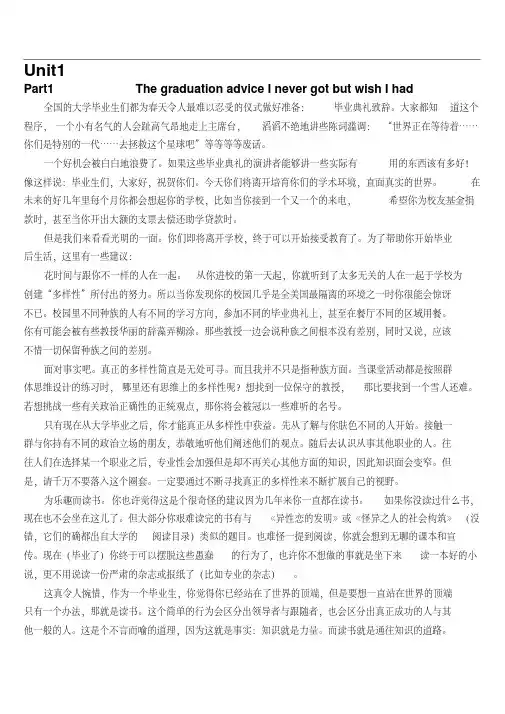
Unit1Part1 The graduation advice I never got but wish I had 全国的大学毕业生们都为春天令人最难以忍受的仪式做好准备:毕业典礼致辞。
大家都知道这个程序,一个小有名气的人会趾高气昂地走上主席台,滔滔不绝地讲些陈词滥调:“世界正在等待着……你们是特别的一代……去拯救这个星球吧”等等等等废话。
一个好机会被白白地浪费了。
如果这些毕业典礼的演讲者能够讲一些实际有用的东西该有多好!像这样说:毕业生们,大家好,祝贺你们。
今天你们将离开培育你们的学术环境,直面真实的世界。
在未来的好几年里每个月你都会想起你的学校,比如当你接到一个又一个的来电,希望你为校友基金捐款时,甚至当你开出大额的支票去偿还助学贷款时。
但是我们来看看光明的一面。
你们即将离开学校,终于可以开始接受教育了。
为了帮助你开始毕业后生活,这里有一些建议:花时间与跟你不一样的人在一起。
从你进校的第一天起,你就听到了太多无关的人在一起于学校为创建“多样性”所付出的努力。
所以当你发现你的校园几乎是全美国最隔离的环境之一时你很能会惊讶不已。
校园里不同种族的人有不同的学习方向,参加不同的毕业典礼上,甚至在餐厅不同的区域用餐。
你有可能会被有些教授华丽的辞藻弄糊涂。
那些教授一边会说种族之间根本没有差别,同时又说,应该不惜一切保留种族之间的差别。
面对事实吧。
真正的多样性简直是无处可寻。
而且我并不只是指种族方面。
当课堂活动都是按照群体思维设计的练习时,哪里还有思维上的多样性呢?想找到一位保守的教授,那比要找到一个雪人还难。
若想挑战一些有关政治正确性的正统观点,那你将会被冠以一些难听的名号。
只有现在从大学毕业之后,你才能真正从多样性中获益。
先从了解与你肤色不同的人开始。
接触一群与你持有不同的政治立场的朋友,恭敬地听他们阐述他们的观点。
随后去认识从事其他职业的人。
往往人们在选择某一个职业之后,专业性会加强但是却不再关心其他方面的知识,因此知识面会变窄。
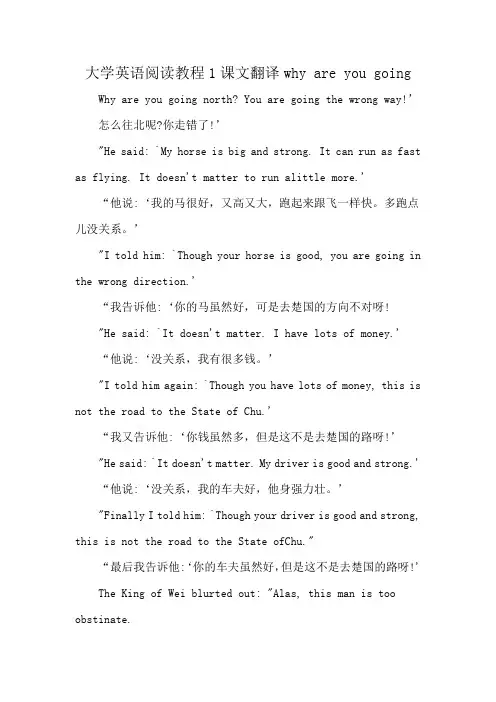
大学英语阅读教程1课文翻译why are you going Why are you going north? You are going the wrong way!’怎么往北呢?你走错了!’"He said: `My horse is big and strong. It can run as fast as flying. It doesn't matter to run alittle more.' “他说:‘我的马很好,又高又大,跑起来跟飞一样快。
多跑点儿没关系。
’"I told him: `Though your horse is good, you are going in the wrong direction.'“我告诉他:‘你的马虽然好,可是去楚国的方向不对呀!"He said: `It doesn't matter. I have lots of money.'“他说:‘没关系,我有很多钱。
’"I told him again: `Though you have lots of money, this is not the road to the State of Chu.'“我又告诉他:‘你钱虽然多,但是这不是去楚国的路呀!’"He said: `It doesn't matter. My driver is good and strong.' “他说:‘没关系,我的车夫好,他身强力壮。
’"Finally I told him: `Though your driver is good and strong, this is not the road to the State ofChu."“最后我告诉他:‘你的车夫虽然好,但是这不是去楚国的路呀!' The King of Wei blurted out: "Alas, this man is too obstinate.魏王脱口说道:“唉!这个人真固执。
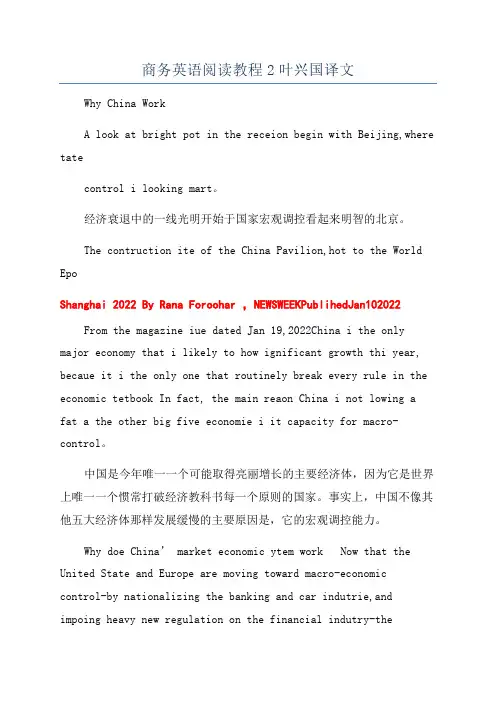
商务英语阅读教程2叶兴国译文Why China WorkA look at bright pot in the receion begin with Beijing,where tatecontrol i looking mart。
经济衰退中的一线光明开始于国家宏观调控看起来明智的北京。
The contruction ite of the China Pavilion,hot to the World EpoShanghai 2022 By Rana Foroohar ,NEWSWEEKPublihedJan102022 From the magazine iue dated Jan 19,2022China i the only major economy that i likely to how ignificant growth thi year, becaue it i the only one that routinely break every rule in the economic tetbook In fact, the main reaon China i not lowing afat a the other big five economie i it capacity for macro-control。
中国是今年唯一一个可能取得亮丽增长的主要经济体,因为它是世界上唯一一个惯常打破经济教科书每一个原则的国家。
事实上,中国不像其他五大经济体那样发展缓慢的主要原因是,它的宏观调控能力。
Why doe China’ market economic ytem work Now that the United State and Europe are moving toward macro-economiccontrol-by nationalizing the banking and car indutrie,and impoing heavy new regulation on the financial indutry-thequetion ha a new urgency。
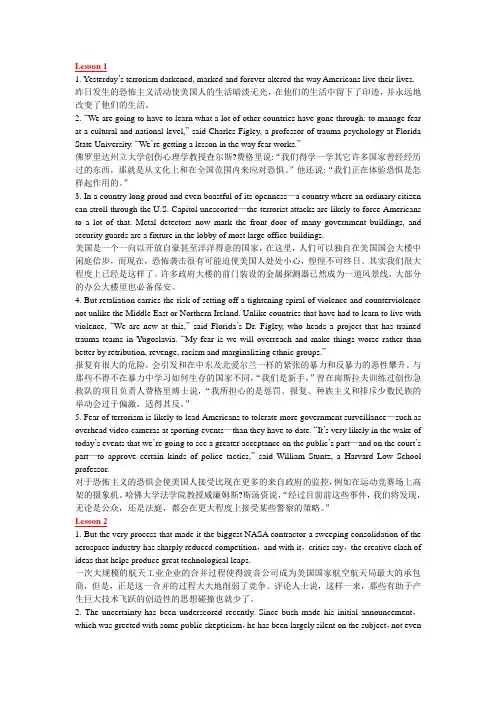
Lesson 11. Yesterday’s terrorism darkened, marked and forever altered the way Americans live their lives. 昨日发生的恐怖主义活动使美国人的生活暗淡无光,在他们的生活中留下了印迹,并永远地改变了他们的生活。
2. “We are going to have to learn what a lot of other countries have gone through: to manage fear at a cultural and national level,” said Charles Figley, a professor of trauma psychology at Florida State University. “We’re getting a lesson in the way fear works.”佛罗里达州立大学创伤心理学教授查尔斯?费格里说:“我们得学一学其它许多国家曾经经历过的东西,那就是从文化上和在全国范围内来应对恐惧。
”他还说:“我们正在体验恐惧是怎样起作用的。
”3. In a country long proud and even boastful of its openness—a country where an ordinary citizen can stroll through the U.S. Capitol unescorted—the terrorist attacks are likely to force Americans to a lot of that. Metal detectors now mark the front door of many government buildings, and security guards are a fixture in the lobby of most large office buildings.美国是一个一向以开放自豪甚至洋洋得意的国家,在这里,人们可以独自在美国国会大楼中闲庭信步,而现在,恐怖袭击很有可能迫使美国人处处小心,惶惶不可终日。
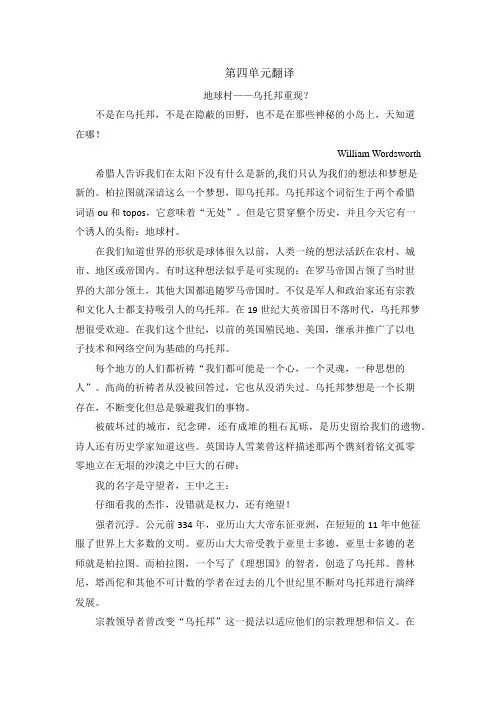
第四单元翻译地球村——乌托邦重现?不是在乌托邦,不是在隐蔽的田野,也不是在那些神秘的小岛上,天知道在哪!William Wordsworth 希腊人告诉我们在太阳下没有什么是新的,我们只认为我们的想法和梦想是新的。
柏拉图就深谙这么一个梦想,即乌托邦。
乌托邦这个词衍生于两个希腊词语ou 和topos,它意味着“无处”。
但是它贯穿整个历史,并且今天它有一个诱人的头衔:地球村。
在我们知道世界的形状是球体很久以前,人类一统的想法活跃在农村、城市、地区或帝国内。
有时这种想法似乎是可实现的:在罗马帝国占领了当时世界的大部分领土,其他大国都追随罗马帝国时。
不仅是军人和政治家还有宗教和文化人士都支持吸引人的乌托邦。
在19世纪大英帝国日不落时代,乌托邦梦想很受欢迎。
在我们这个世纪,以前的英国殖民地、美国,继承并推广了以电子技术和网络空间为基础的乌托邦。
每个地方的人们都祈祷“我们都可能是一个心,一个灵魂,一种思想的人”。
高尚的祈祷者从没被回答过,它也从没消失过。
乌托邦梦想是一个长期存在,不断变化但总是躲避我们的事物。
被破坏过的城市,纪念碑,还有成堆的粗石瓦砾,是历史留给我们的遗物。
诗人还有历史学家知道这些。
英国诗人雪莱曾这样描述那两个镌刻着铭文孤零零地立在无垠的沙漠之中巨大的石碑:我的名字是守望者,王中之王:仔细看我的杰作,没错就是权力,还有绝望!强者沉浮。
公元前334年,亚历山大大帝东征亚洲,在短短的11年中他征服了世界上大多数的文明。
亚历山大大帝受教于亚里士多德,亚里士多德的老师就是柏拉图。
而柏拉图,一个写了《理想国》的智者,创造了乌托邦。
普林尼,塔西佗和其他不可计数的学者在过去的几个世纪里不断对乌托邦进行演绎发展。
宗教领导者曾改变“乌托邦”这一提法以适应他们的宗教理想和信义。
在公元4世纪,君士坦丁大帝统治下的罗马帝国正式批准以基督教为国教,建立罗马天主教教会制度,以此统治西方世界,号称神圣罗马帝国。
其他宗教,例如以被上帝所选的人为教义的犹太教、伊斯兰教及它的穆罕默德和真主阿拉,都有他们自己的乌托邦。
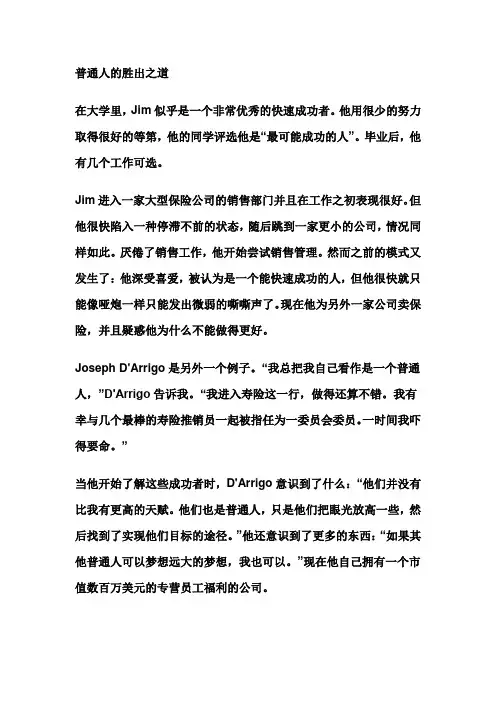
普通人的胜出之道在大学里,Jim似乎是一个非常优秀的快速成功者。
他用很少的努力取得很好的等第,他的同学评选他是“最可能成功的人”。
毕业后,他有几个工作可选。
Jim进入一家大型保险公司的销售部门并且在工作之初表现很好。
但他很快陷入一种停滞不前的状态,随后跳到一家更小的公司,情况同样如此。
厌倦了销售工作,他开始尝试销售管理。
然而之前的模式又发生了:他深受喜爱,被认为是一个能快速成功的人,但他很快就只能像哑炮一样只能发出微弱的嘶嘶声了。
现在他为另外一家公司卖保险,并且疑惑他为什么不能做得更好。
Joseph D'Arrigo是另外一个例子。
“我总把我自己看作是一个普通人,”D'Arrigo告诉我。
“我进入寿险这一行,做得还算不错。
我有幸与几个最棒的寿险推销员一起被指任为一委员会委员。
一时间我吓得要命。
”当他开始了解这些成功者时,D'Arrigo意识到了什么:“他们并没有比我有更高的天赋。
他们也是普通人,只是他们把眼光放高一些,然后找到了实现他们目标的途径。
”他还意识到了更多的东西:“如果其他普通人可以梦想远大的梦想,我也可以。
”现在他自己拥有一个市值数百万美元的专营员工福利的公司。
为什么像D'Arrigo这样的普通人似乎经常能比像Jim一样的人取得更多的成功呢?为了找出其中的原因,在我作为公司咨询者的工作中,我与超过190个人进行了面谈。
非正式调查的结果为我证实了Theodore Roosevelt曾经说过的话:“成功的普通人不是天才,他仅仅拥有平凡品质,但他将他的那些平凡品质发展到超出常人的水平。
”我坚信那些胜出的普通人有以下特点:懂得自律。
“你不需要成功的天赋,”科罗拉多州丹佛市Porter纪念医院的首席执行官,因扭转经营不善的医院而获得名望的Irwin C. Hansen 强调“你的全部所需是一大罐胶水。
你在你的椅子上涂上一些,在裤子的臀部涂上一些,然后坐在上面,坚持做每一件事直到你做到了你自己的最好。
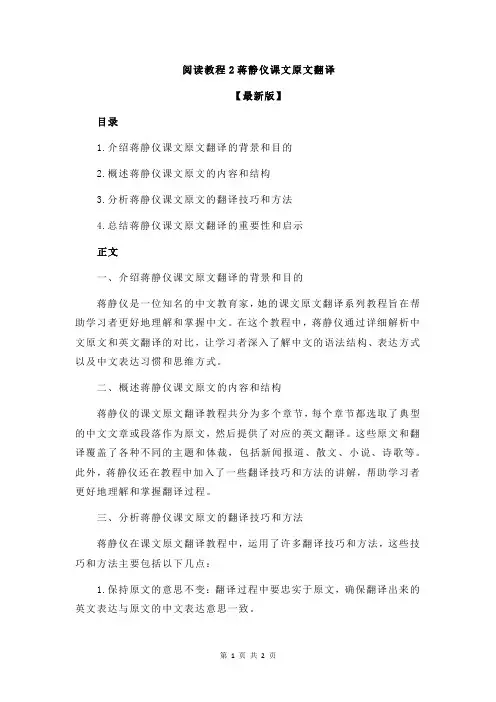
阅读教程2蒋静仪课文原文翻译【最新版】目录1.介绍蒋静仪课文原文翻译的背景和目的2.概述蒋静仪课文原文的内容和结构3.分析蒋静仪课文原文的翻译技巧和方法4.总结蒋静仪课文原文翻译的重要性和启示正文一、介绍蒋静仪课文原文翻译的背景和目的蒋静仪是一位知名的中文教育家,她的课文原文翻译系列教程旨在帮助学习者更好地理解和掌握中文。
在这个教程中,蒋静仪通过详细解析中文原文和英文翻译的对比,让学习者深入了解中文的语法结构、表达方式以及中文表达习惯和思维方式。
二、概述蒋静仪课文原文的内容和结构蒋静仪的课文原文翻译教程共分为多个章节,每个章节都选取了典型的中文文章或段落作为原文,然后提供了对应的英文翻译。
这些原文和翻译覆盖了各种不同的主题和体裁,包括新闻报道、散文、小说、诗歌等。
此外,蒋静仪还在教程中加入了一些翻译技巧和方法的讲解,帮助学习者更好地理解和掌握翻译过程。
三、分析蒋静仪课文原文的翻译技巧和方法蒋静仪在课文原文翻译教程中,运用了许多翻译技巧和方法,这些技巧和方法主要包括以下几点:1.保持原文的意思不变:翻译过程中要忠实于原文,确保翻译出来的英文表达与原文的中文表达意思一致。
2.注意语法结构的转换:中文和英文的语法结构有所不同,翻译时要注意将中文的语法结构转换成英文的语法结构,使翻译更加流畅和自然。
3.保持语言风格的一致性:翻译时要注意保持原文的语言风格,如正式、口语、幽默等,确保翻译出来的英文表达与原文的中文表达风格一致。
4.适当增删词汇:翻译过程中,有时需要适当增删词汇,以使翻译更加通顺和易于理解。
四、总结蒋静仪课文原文翻译的重要性和启示蒋静仪的课文原文翻译教程对于学习者来说具有重要的参考价值和启示。
通过学习蒋静仪的翻译教程,学习者可以更好地理解中文的语法结构和表达方式,提高自己的翻译能力。
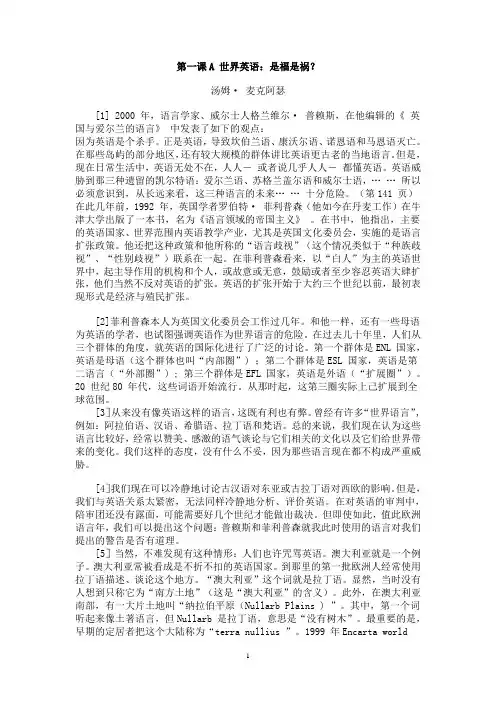
第一课A 世界英语:是福是祸?汤姆·麦克阿瑟[1] 2000 年,语言学家、威尔士人格兰维尔·普赖斯,在他编辑的《英国与爱尔兰的语言》中发表了如下的观点:因为英语是个杀手。
正是英语,导致坎伯兰语、康沃尔语、诺恩语和马恩语灭亡。
在那些岛屿的部分地区,还有较大规模的群体讲比英语更古老的当地语言。
但是,现在日常生活中,英语无处不在,人人―或者说几乎人人―都懂英语。
英语威胁到那三种遗留的凯尔特语:爱尔兰语、苏格兰盖尔语和威尔士语,……所以必须意识到,从长远来看,这三种语言的未来……十分危险。
(第141 页)在此几年前,1992 年,英国学者罗伯特·菲利普森(他如今在丹麦工作)在牛津大学出版了一本书,名为《语言领域的帝国主义》。
在书中,他指出,主要的英语国家、世界范围内英语教学产业,尤其是英国文化委员会,实施的是语言扩张政策。
他还把这种政策和他所称的“语言歧视”(这个情况类似于“种族歧视”、“性别歧视”)联系在一起。
在菲利普森看来,以“白人”为主的英语世界中,起主导作用的机构和个人,或故意或无意,鼓励或者至少容忍英语大肆扩张,他们当然不反对英语的扩张。
英语的扩张开始于大约三个世纪以前,最初表现形式是经济与殖民扩张。
[2]菲利普森本人为英国文化委员会工作过几年。
和他一样,还有一些母语为英语的学者,也试图强调英语作为世界语言的危险。
在过去儿十年里,人们从三个群体的角度,就英语的国际化进行了广泛的讨论。
第一个群体是ENL 国家,英语是母语(这个群体也叫“内部圈”) ;第二个群体是ESL 国家,英语是第二语言(“外部圈”) ; 第三个群体是EFL 国家,英语是外语(“扩展圈”)。
20 世纪80 年代,这些词语开始流行。
从那时起,这第三圈实际上己扩展到全球范围。
[3]从来没有像英语这样的语言,这既有利也有弊。
曾经有许多“世界语言”, 例如:阿拉伯语、汉语、希腊语、拉丁语和梵语。
总的来说,我们现在认为这些语言比较好,经常以赞美、感激的语气谈论与它们相关的文化以及它们给世界带来的变化。
World English: A Blessing or a Curse? Universal languageBy Tom McArthur[1] In the year 2000, the language scholar Glanville Price, a Welshman, made the following assertion as editor of the book Languages in Britain and Ireland:For English is a killer. It is English that has killed off Cumbric, Cornish, Norn and Manx. There are still parts of these islands where sizeable communities speak languages that were there before English. Yet English is everywhere in everyday use and understood by all or virtually(actually) all, constituting such a threat to the three remaining Celtic languages, Irish, Scottish Gaelic, and Welsh... that their long-term future must be considered... very greatly at risk. (p 141) Some years earlier, in 1992, Robert Phillipson, English academic who currently (at the present/ at the moment) works in Denmark, published with Oxford a book entitled Linguistic Imperialism. In it, he argued that the major English-speaking countries, the worldwide English-language teaching industry, and notably (especially) the British Council pursue policies of linguistic aggrandisement. He also associated such policies with a prejudice which he calls linguicism[a condition parallel to(equal to/ similar to) racism and sexism]. As Phillipson sees it, leading institutions and individuals within the predominantly "white" English-speaking world, have [by design(=deliberately) or default(=mistake)] encouraged or at least tolerated—and certainly have not opposed—the hegemonic spread of English, a spread which began some (about) three centuries ago as (when) economic and colonial expansion.[2] Phillipson himself worked for some years for the British Council, and he is not alone among Anglophone academics who have sought to point up the dangers of English as a world language. The internationalization of English has in the last few decades been widely discussed in terms of three groups: first, the ENL countries, where English is a native language (this group also being known as the "inner circle"); second, the ESL countries, where English is a second language (the "outer circle"); and third, the EFL countries, where English is a foreign language (the "expanding circle"). Since the 1980s, when such terms became common, this third circle has in fact expanded to take in the entire planet.[3] For good or for ill, there has never been a language quite like English. There have been many "world languages", such as Arabic, Chinese, Greek, Latin, and Sanskrit. By and large, we now view them as more or less benign, and often talk with admiration and appreciation about the cultures associated with them and what they have given to the world. And it is fairly (very) safe to do this, because none of them now poses much of a threat.[4] English however is probably (perhaps) too close for us to be able to analyze and judge it as dispassionately (objectively), as we may now discuss the influence of Classical Chinese on East Asia or of Classical Latin on Western Europe. The jury is still out in the trial of the English language, and may take several centuries to produce its verdict, but even so we can ask, in this European Year of Languages, whether Price and Phillipson are right to warn us all about the language that I am using at this very moment. [warn sb. of sth.][5] It certainly isn't hard(difficult) to look for situations (examples) where people might call English a curse. An example is Australia, which is routinely regarded as a straightforward English-speaking country. The first Europeans who went there often used Latin to describe and discuss the place. The word Australia itself is Latin; evidently (Obviously/ Apparently) no one at the time thought of simply calling it "Southland" (which is what Australia means). In addition(besides), in South Australia there is a wide stretch of land called the Nullarbor Plains, the first word of which sounds Aboriginal, but nullarbor is Latin and means "no trees". And most significantly of all, the early settlers called the continent a terra nullius. According to the Encarta World English Dictionary (1999) the Latin phrase terra nullius means:... the idea and legal concept that when the first Europeans arrived in Australia the land was owned by no one and therefore open to settlement. It has been judged not to be legally valid.But that judgment was made only recently. When the Europeans arrived, Australia was thinly populated—but populated nonetheless (from then on)—from coast to coast in every direction. There were hundreds of communities and languages. Many of these languages have died out, many more are in the process of dying out, and these dead and dying languages have been largely replaced (substituted) by either kinds of pidgin English or general Australian English. Depending on your point of view, this is either a tragic loss or the price of progress.[6] At the same time, however, can the blame for the extinction of Aboriginal languages be laid specifically at the door of English? The first Europeans to discover Australia were Dutch, and their language might have become the language of colonization and settlement. Any settler language could have had the same effect. If for example the Mongols had sustained their vast Eurasian empire, Mongolian might have become a world language and gone to Australia. Again, if history had been somewhat (a little) different, today's world language might have been Arabic, a powerful language in West Asia and North Africa that currently affects many smaller languages, including Coptic and Berber. Spanish has adversely (negatively) affected indigenous languages in so-called "Latin" America, and Russian has spread from Europe to the Siberian Pacific. If English is a curse and a killer, it may only be so in the sense (meaning) that any large language is likely (possible) to influence and endanger smaller languages.[7] Yet many people see (consider/ regard) English as a blessing. Let me leave aside here the obvious advantages possessed by any world language, such as a large communicative network, a strong literary and media complex (network), and a powerful cultural and educational apparatus (organization). Let us instead look at something rather different: the issue (problem) of politics, justice, and equality. My object (target) lesson this time is South Africa. Ten years ago, South Africa ceased (stopped) to be governed on principles of racial separateness, a system known in Afrikaans (a language derived from Dutch) as apartheid. The system arose (occurred) because the Afrikaner community—European settlers of mainly Dutch descent—saw themselves as superior to the indigenous (native) people of the land they had colonized.[8] English-speaking South Africans of British descent were not particularly strong in opposing the apartheid regime (rule), and the black opposition, whose members had many languages, was at first weak and disorganized. However, the language through which this opposition gained (obtained/ got) strength and organization was English, which became for them the key language of freedom and unity, not of oppression. There are today eleven official languages in South Africa—English, Afrikaans, and nine vernacular languages that include Zulu, Ndebele, and Setswana. But which of these nine do black South Africans use (or plan to use) as their national lingua franca? Which do they wish their children to speak and write successfully (in addition to their mother tongues)? The answer is none of the above. They want English, and in particular (especially/ specifically) they want a suitably Africanized English.[9] So, a curse for the indigenous peoples of Australia and something of a blessing for those in South Africa...[10] How then should we think of English in our globalizing world with its endangered diversities? The answer, it seems to me, is crystal clear. Like many things, English is at times (often) a blessing and at times a curse—for individuals, for communities (society), for nations, and even for unions of nations. The East Asian symbolism of yin and yang might serve (illustrate) well here: There is something of yang in every yin, of yin in every yang. Although they are opposites, they belong together: in this instance (case) within the circle of communication. Such symbolism suggests (shows) that the users of the world's lingua franca should seek to benefit as fully as possible from the blessing and as far as possible avoid invoking the curse. (1, 292 words)ABOUT THE AUTHORDr. Tom McArthur is founder editor of the Oxford Companion to the English Language (1992) and the quarterly English Today: The International Review of the English Language (Cambridge, 1985—). His more than 20 published works include the Longman Lexicon of Contemporary English (1981), Worlds of Reference: Language, Lexicography and Learning from the Clay Tablet to the Computer (1986), and The English Languages (1998). He is currently Deputy Director of the Dictionary Research Center at the University of Exeter.EXERCISESI. Reading ComprehensionAnswer the following questions or complete the, following statements.1. It can be inferred from Glanville Price's statement that he is ______.A. happy that English is everywhere in Britain and IrelandB. worried about the future of the remaining Celtic languagesC. shocked by the diversity of languages in Britain and IrelandD. amazed that many people in the UK still speak their Aboriginal languages2. Cumbric is used as an example of ______.A. a local dialectB. a victim of the English languageC. a language that is on the verge of extinctionD. a language that is used by only a limited number of people3. Which of the following is the major concern of the book Linguistic Imperialism?A. English teaching overseas.B. British government's language policies.C. Dominance of English over other languages.D. The role of English in technology advancement.4. Both Price and Phillipson are ______.A. government officialsB. advocates of linguistic imperialismC. in support of language policies carried out by the British CouncilD. concerned about the negative effect of English on smaller languages5. According to the text, the EFL countries ______.A. are large in numberB. is known as the "outer circle"C. will be endangered by EnglishD. have made English their official language6. According to McArthur, Chinese is different from English in that ______.A. it has made a great contribution to the worldB. it has had positive influence on other languagesC. it may result in the disappearance of other languagesD. it probably will not endanger the existence of other languages7. When he said the jury is out in the trial" (Line 3, Paragraph 4), McArthur meant ______.A. punishment is dueB. the jury is waiting for a trialC. no decision has been made yetD. there is no one to make the decision8. Australia might be used as an example to show that ______.A. languages are changing all the timeB. some English words are derived from LatinC. English has promoted the progress of some nationsD. English should be blamed for the extinction of smaller languages9. Many people see English as a blessing for people in ______.A. AustraliaB. East AsiaC. South AfricaD. ESL countries10. The main theme of this speech is that ______.A. English should be taught worldwideB. English as a world language does more harm than goodC. we should be objective to the internationalization of EnglishD. we should be aware of (realize) the danger of English as a world languageB. Questions on global understanding and logical structures1. Why does McArthur introduce Glanville Price and Robert Phillipson's points of view on the spread of English? What is his? Intention?McArthur quotes Price’s assertion and cites Pillipson’s viewpoint on the spread of English as sort of cons to initiate his argument. Cons are usually popularly believed arguments or opinions that are against the author’s point of view. Cons are c ommonly used writing techniques and are often employed in order to appeal the audience and highlight the author’sviewpoint.2. Does McArthur agree with what Price and Phillipson argued? From as early as which section does McArthur show his attitude? Toward the dominance of English as a world English?No. McArthur’s opinion is different from Price and Pillipson’s arguments. He doesn’t believe that English is a killer and should be blamed for the extinction of smaller languages. He sees English as both a blessing and a curse, maybe as a blessing more than a curse. After introducing Price and Pillipson’s viewpoints, McArthur writes about his own ideas on the issue of English as a world language. From the sentence “For good or for ill, there has never been a language quite like English”, we can learn that McArthur does not curse English like Price and Pillipson and he has a different point of view.3. By reading "It certainly isn't hard to look for situations where people might call English a curse", could we conclude that McArthur believes English is a curse?No. This sentence is a kind of justification. Although McArthur literally justifies the fact that there are situations where people might call English a curse, he doesn’t believe that English is virtua lly a curse. By adding the word “certainly” McArthur shows his intent.4. Could you pick up some words and expressions that signal change or continuation in McArthur's thought?“For good or for ill”(paragraph 3) /“however”(paragraph 4) /“But”(paragraph 5) / “At the same time, however”(paragraph 6) /“Yet”(paragraph 7)5. How many parts can this speech be divided? How are the parts organized?Part One: paragraphs 1 and 2. These two paragraphs introduce the situation that many academics argue against English as a world language.Part Two: paragraphs 3, 4, 5, 6, 7, 8, and 9. Paragraph three is a transitional paragraph that initiates McArthur’s own argument. In these paragraphs McArthur argues that English is not only a curse as many people have believed, but a blessing as well.Part Three: paragraph 10. McArthur concludes in the last paragraph that English may be a curse or a blessing depends on different situations and we should make advantages of world languages and avoid their disadvantages.II. VocabularyA. Choose the best word from the four choices to complete each of the following sentences.1. There has been much opposition from some social groups, ______ from the farming community.A. straightforwardlyB. notably(especially)C. virtuallyD. exceptionally2. The ______ view in Britain and other Western countries associates aging with decline, dependency, isolation, and often poverty (property).A. predominantB. credulousC. inclusive(<->exclusive)D. sustainable3. But gifts such as these cannot be awarded to everybody, either by judges or by the most ___ of governments./ reward rewarding [a gifted / talented person]A. toughB. demandingC. diverseD. benign (kind)4. The foreman read the ______ of guilty fourteen times, one for each defendant.A. prejudiceB. verificationC. verdictD. punishment5. They fear it could have a(n) ______ effect on global financial markets.A. sizeableB. adverse(negative)C. beneficialD. consequential6. The UN threatened to ______ economic sanctions if the talks were broken off.A. engageB. pursueC. abandon/ abundantD. invoke7. There are at least four crucial differences between the new ______ and the old government.A. regimeB. hegemonyC. complexD. federation/ fedal<->federal, confederate)8. These questions ______ a challenge to established attitude of superiority toward the outside world.A. evolveB. constituteC. tolerateD. aroused9. Because of this, a strong administrative ______ was needed to plan the use of scarce resources, organize production and regulate distribution.A. apparatusB. constitutionC. insistenceD. promotion10. I learnt that there are no genuinely ______ animals in this area, all the animals were brought here from other places.A. endangeredB. domesticated (tamed)C. indigenousD. extinctB. Choose the hest word or expression from the list given for each Honk Use each word or expression only once and make proper changes where necessary.point up by and large take in descent for good or illleave aside crystal clear die out endanger lay... at the door of1. The book concludes with a review of the possible impact (influence) of more intimate computers for good or ill, in various areas of human life.2. Moreover, it had become clear from the opinion polls that the unpopularity of the new tax was being laid at the door of the government which had introduced it, rather than the local authorities who were responsible for levying and collecting it.3. This case gave the example of breaking someone's arm: that is a really serious injury, but one which is unlikely to endanger the victim's life.4. Many of those who hold it live in poor areas and some are Colored, that is (=i.e./ namely), of mixed European and African descent.5. This debate is important because that "the facts" are not6. In the beginning, the meaning of life might be debated, but once past the first period, many of the conversations follow a well-worn route from one topic to the next and back again, taking in most of human life. [worn-out]7. But since agriculture forms the basis (base) of our industry, it was, by and large (on the whole), also an intensification of the crisis in the national economy in general.8. Let us factors such as education, career structure, pay and9. It is true that the exact nature of this issue is uncertain. However, one thing is crystal clear: it will not endanger the planet and its inhabitants. (habitat)10. But if animal populations are too small, then they simply die out.III. ClozeThere are ten blanks in the following passage. Read the passage carefully and choose the best answer from the four choices given for each blank. [(criterion) criteria: (1)semantic/(2)grammatical]A simplified form of the English language based on 850 key words was developed in the late 1920s by the English psychologist Charles Kay Ogden and 1 by the English educator I. A. Richards. Known as Basic English, it was used mainly to teach English to non-English-speaking persons and 2 as an international language. The complexities of English spelling and grammar, however, were major 3 to the adoption of Basic English as a second language.The fundamental principle of Basic English was that any idea, 4 complex, may be reduced to simple units of thought and expressed clearly by a limited number of everyday words. The 850-word primary vocabulary was 5 600 nouns (representing things or events), 150 adjectives (for qualities and _ 6 ), and 100 general "operational" words, mainly verbs and prepositions. Almost all the words were in 7 use in English-speaking countries. More than 60 percent of them were one-syllable words. The basic vocabulary was created 8 by eliminating numerous words which have the same or similar meanings and by 9 the use of 18 "basic" verbs, such as make, get, do, have, and be. These verbs were generally combined with prepositions, such as up, among, under, in, and forward. For example, a Basic English student would use the expression “go up”10 "ascend".1. A. created B. publicized C. invented D. operated2. A. proved B. provided C. projected D. promoted3. A. advantages B. objections C. obstacles D. facileties4. A. however B. whatever C. wherever D. whenever5. A. comprised of B. made of C. composed of D. constituted of6. A. personalities B. properties C. preferences D. perceptions/ perceive)7. A. common B. ordinary C. average D. nonprofessional8. A. in all B. at times C. for good D. in part/ partially)9. A. experiencing B. exchanging C. excluding D. extending10. A. in spite of =despite B. in favor of C. instead of D. in case ofII. TranslationPut the following passages into Chinese.1. For English is a killer. It is English that has killed off Cumbric, Cornish, Norn and Manx. There are still parts of these islands where sizeable communities speak languages that were there before English. Yet English is everywhere in everyday use and understood by all or virtually all, constituting such a threat to the three remaining Celtic languages, Irish, Scottish Gaelic, and Welsh... that their long-term future must be considered... very greatly at risk.因为英语是个杀手。
阅读教程4第二版蒋静仪课文翻译Aesthetic Surgery involves techniques intendedfor the"enhancement"of appearance throughsurgical and medical techniques,and isspecifically concerned with maintaining normal appearance,restoring it,or enhancing itbeyond the average level toward someaesthetic ideal.In 2006,nearly 11 million cosmetic surgerieswere performed in the United States alone.The number of cosmetics proceduresperformed in the United States has increasedover 50 percent since the start of the century.Nearly 12 million cosmetic surgeries wereperformed in 2007,with the five most commonbeing breast augmentation,liposuction,nasalsurgery,eyelid surgery and abdominoplasty.The increased use of cosmetic surgery crossesracial and ethnic lines in the U.S,withincreases seen among African-Americans andHispanic Americans as well as CaucasianAmericans.In Europe,the second largestmarket for cosmetic procedures,cosmeticsurgery is a$2.2 billion business.Abdominoplasty(or"tummy tuck"):reshaping and firming of the abdomen Blepharoplasty(or"eyelid surgery"):Reshaping of the eyelids or theapplication of permanent eyeliner,including Asian blepharoplastyBreast augmentation("breast enlargement"or"boob job"):Augmentation of the breasts.This can involve either fat grafting,saline or silicone gel prosthetics. Initially performed to women with micromastia Breast reduction:Removal of skin and glandular tissue. Indicated to reduce back and shoulder pain in women with gigantomastia and/or for psychological benefit in women with gigantomastia/macromastia and men with gynecomastia.Breast lift(Mastopexy):Lifting or reshaping of breaststo make them less saggy,often after weight loss(after a pregnancy,for example).It involves removal of breast skin as opposed to glandular tissue or scarless Serdev suture techniqueButtock Augmentation(or"butt augmentation"or"butt implants"):Enhancement of the buttocks.Thisprocedure can be performed by using silicone implants or fat grafting and transfer from other areas of the body.Buttock lift(or"butt lift"or"brazilian butt lift"):Lifting, projection,tightening of the buttocks.This procedurecan be performed by using the scarless Serdev suture technique without implants.[10]Chemical peel:Minimizing the appearance of acne, pock,and other scars as well as wrinkles(dependingon concentration and type of agent used,except for deep furrows),solar lentigines(age spots,freckles),and photodamage in general.Chemical peels commonly involve carbolic acid(Phenol),trichloroacetic acid(TCA),glycolic acid(AHA),or salicylic acid(BHA)as the active agent.Rhinoplasty(or"nose job"):Reshaping of the nose Otoplasty(or ear surgery):Reshaping of the ear.Most often done by pinning the ear closer to the head. Rhytidectomy(or"face lift"):Removal of wrinkles and signs of aging from the faceSuction-Assisted Lipectomy(or liposuction):Removal of fat from the bodyBrow lift:higher brow position by surgical or scarless Serdev sutureChin augmentation:Augmentation of the chin with an implant(e.g.silicone),by sliding genioplasty of the jawbone,or by suture of the soft tissue.Cheek augmentation by suture Serdev sutureCheek lift/Midface lift using scarless suture technique. Collagen,fat,and other tissue fller injections(e.g. hyaluronic acid)Laser skin resurfacing1.Why do you think the youths are concerned about the appearance?2.What is beauty?Is there a standard to evaluate it?3.Why does the author think the sense of insecurity about look is a common phenomenon?4.Where do the pressures that make people worry about appearance come from?5.What'S author’S attitude towards the exaggerated concern about body image?6.How would you describe your own looks using appropriate words in this text?7.DO you think it is easier for better-looking people toreceive better job?。
A simplified form of the English language based on 850 key wordswas developed in the late 1920s by the English psychologist Charles KayOgden and publicized by the English educator I. A. Richards. Known as Basic English, it was used mainly to teach English to non-Englishspeaking persons and promoted as an in ternational language. The complexities ofEnglish spelling and grammar, however, were major obstaclesto the adoption of Basic English as a second language. The fundamental principle of Basic English was that any idea,however complex, may be reduced to simple units of thoughtand expressed clearly by a limited number of everyday words. The 850-wordprimary vocabulary was composed of 600 nouns (representingthings or events), 150 adjectives (for qualities and6 properties ), and100 general "operational" words, mainly verbs and prepositions. Almost all the wordswere in 7 common use in English-speaking countries. More than 60 percentofthem were one-syllable words. The basic vocabulary was created in part/ partiallyby eliminating numerous words which have the same or similar meanings and by extending the use of 18 "basic" verbs, such as make, get, do, have, and be. These verbs were generally combined with prepositions, such as up, among, under, in, and forward. F or example, a Basic English student would use the expression ‘’go up”10 instead of "ascend ‘’。
The Weird World of TobaccoBy Anna Quidlen[1] Imagine that millions of Americans are addicted to a lethal (poisonous/ deadly) drug, yet the Food and Drug Administration had repeatedly refused to regulate (control) it. Imagine that when (while) the FDA does its duty, an appeals court decides it cannot do so, that the drug is so dangerous that if the FDA regulated it, it would have to be banned.[2] Welcome to the topsy-turvy (是非颠倒的) world of tobacco, where nothing much makes sense (be meaningful) except the vast profits, where tobacco-company executives slip-slide along the continuum (连续统一体) from aggrieved (sad) innocence to heartfelt (sincere真诚的) regret without breaking (shed blood) a sweat, and where the only people who seem to be able to shoot straight (hit the target命中目标的) are the jurors (judges) who decide the ubiquitous (common) lawsuits.[3] The most recent panel (court) handed down a judgment of $ 145 billion—the largest jury award in history—on behalf of sick smokers in Florida. Lawyers for the tobacco companies thundered that the judgment would bankrupt them, yet the stock market scarcely (hardly) shuddered. Experts said the amount would likely (possible) be reduced when cooler judicial heads prevailed.[4] The jurors—who gave up two years of their lives, listened to endless witnesses and yet deliberated (gave) only a few hours—could be forgiven if they felt they'd fallen down Alice's rabbit hole into Wonderland, where the Queen of Hearts cries "Off with their heads (Kill them)" but no one is ever executed (killed).[5] Al Gore, for instance, inspired (=encouraged) by the death of his sister from lung cancer, has insisted that he will do everything he can to keep cigarettes out of the hands of children. But he says he would never outlaw cigarettes because millions of people smoke. How many users mandate legality? What about the estimated 3.6 million chronic cocaine users, or the 2. 4 million people who admit to having shot (injected) or snorted heroin?[6] I can almost feel all the smokers, tired of standing outside their office buildings puffing in the rain, jumping up and down and yelling, "Tobacco is different from illicit drugs!" Because it is legal? Now there's a circular argument.[7] A hundred years ago the sale of cigarettes was against the law in 14 states. The Supreme Court had concluded of (about) cigarettes, "They possess no virtue (good quality), but are inherently bad, and bad only." At the time (Then), Coca-Cola contained traces of cocaine, and heroin was in cough syrups.[8] Since then tobacco companies have spread political contributions around like weedkiller on the lawn in summer, supporting largely complicit Republicans, who like free enterprise (and soft money) more than they hate emphysema. (George W. Bush responded to a question about the recent mega-settlement (judge/ decision) by bemoaning a litigious nation.)[9] Responsibility-minded Americans accept (considered) the argument that individuals have the right to poison themselves, although studies showing that the vast majority of smokers began as minors (as young children) raise questions about informed consent.[10] Official tobacco apologists (apology. n./ apologize. vt.) spent years insisting their product did not cause cancer, and then that it was not addictive (n.). Now they've done a 180, arguing that since there is no such thing as a safe cigarette, the FDA, created to regulate the safety of products, cannot touch them. If this sounds (=is) like having it both ways, that's because it is.[11] Meanwhile (=at the same time), Philip Morris makes large contributions to soup kitchens, ballet companies, museums and shelters—being a good citizen with the profits of a product that kills 400, 000 people a year. And magazines run articles about the dangers of cigarettes in the same issues that advertise them.[12] Even tobacco foes have fudged (hesitated). When Dr. David Kessler ran (administrate) the FDA, he publicly concluded (said) what everyone already knew: that cigarettes are nothing more than a delivery device (media) for nicotine, a dangerous and addictive drug. But the agency did not take the obvious next step. The Food, Drug, and Cosmetic Act forbids the sale (sell) of any drug that is not safe and effective, and part of the FDA's mandate (responsibility) is to regulate devices. Cigarettes are a device (media/ equipment). The drug and chemicals they deliver are patently (obviously) unsafe. Ergo (Therefore), cigarettes should be banned.[13] That's not going to happen in our lifetime. Too many tobacco farmers, too many tobacco addicts; a right to a livelihood (happiness), a right to a lifestyle. [These arguments (reasons) hold for (support) legalizing illicit drugs as well, but never mind.][14] "Prohibition" is a dirty word in America. But tobacco can in no way be compared with alcohol. Many people can and do drink safely and in moderation, while it is impossible to smoke without some pernicious health effects, and nearly (almost) all smokers can be described as addicts.[15] Public-service announcements, catchy (attractive) commercials (advertisements) for kids, settlements with the states to recover (pay) health care costs: the tobacco companies, which once swore they were doing nothing wrong, are now willing to lose some ideological battles to win the war of the profit margin. One Philip Morris executive appearing at a recent (press) conference told Kessler, whose efforts to restrict sales and advertising aimed at children spawned (fought) a battle royal of billable hours, that he welcomed "serious regulation (control) of the tobacco industry at the federal level". Now they tell us.[16] Why shouldn't the Marlboro men play the angles? The public and the pols have provided them with so many (chances to play angles).[17] Here is the bottom line: cigarettes are the only legal product that, when (while) used as directed (directly) cause death. (843 words)ABOUT THE AUTHORAnna Quindlen (1956— ) is a graduate of Barnard College. As a columnist at The New York Times from 1981 to 1994, in 1990 Quindlen became only the third woman in the paper's history to write a regular column for its influential Op-Ed page. In 1992 Quindlen won the Pulitzer Prize for Commentary. In 2000, Quindlen became the first writer ever to have books appear on the fiction, nonfiction, and self-help New York Times Best Seller lists.EXERCISESI. Reading ComprehensionA. Answer the following questions or complete the following statements.1. After a panel judgment of $ 145 billion was awarded, the stock market _____.A. witnessed an immediate downturnB. soared in a matter of daysC. slightly increased in sales volumeD. remained almost unaffected2. Which of the following is closest in meaning to "without breaking a sweat" as used in Para. 2?A. Without much difficulty.B. Without much consideration.C. Without much delay.D. Without much guilt.3. After the jurors reached the $ 145 billion verdict, tobacco companies _____.A. had to pay the amount as demandedB. didn't receive the punishment they deserveC. announced to apply for bankruptcyD. gave up profits for a better corporate image4. What is the reason given by Al Gore for not banning cigarettes?A. There are millions of smokers in the U. S.B. There are millions of tobacco farmers in the U. S.C. Tobacco companies are important tax-payers.D. Tobacco consumption is a stimulus to economy.5. Which of the following statements is true?A. Sale of cigarettes has always been a legal commercial activity.B. Use of cocaine or heroin has always been banned by law.C. Cigarettes are not as harmful as cocaine or heroin in nature.D. Cocaine or heroin used to be considered safer than cigarettes.6. We can draw the conclusion that the author's attitude toward Republican policy on tobacco is _____.A. supportiveB. indifferentC. criticalD. obscure7. What is the present argument put forward by tobacco companies to reject FDA regulation?A. Little evidence proves that cigarettes can cause cancer.B. Few smokers show signs as tobacco addicts.C. FDA lacks the legal right to ban cigarettes.D. Smokers have the right to smoke as they wish.8. What does the author think of the arguments against banning cigarettes and the future of cigarettes?A. The arguments are strong, and cigarettes will not be banned.B. The arguments are strong, but cigarettes will be banned.C. The arguments are not strong, and cigarettes will be banned.D. The arguments are not strong, but cigarettes will not be banned.9. The author's primary purpose in writing this text is to _____.A. prove the harmful effects of cigarettesB. advocate regulation and banning of cigarettesC. analyze the lawsuits against tobacco companiesD. call on smokers to give up cigarettes10. Tobacco companies are now willing to admit wrongdoing because they have their mind on _____.A. smokers' healthB. government regulationC. commercial profitD. public pressureB. Complete the following outline of the text by filling in the blanks.1. The world of tobacco is a weird world because _____.2. Arguments for and against banning of tobacco3. Tobacco companies have tried to win support for their products by(1) making contributions to the Republicans to win their political support.(2) making contributions to soup kitchens, ballet companies, museums and shelters to buildan image of being a good citizen.(3) admitting their wrong-doing in order to win the war of the profit margin.4. Conclusion:The author's attitude toward tobacco: Tobacco should be banned.The future of tobacco: Tobacco may not be banned in our lifetime.II. VocabularyA. Read the following sentence% and decide which of the Jour choices below each sentences is closest in meaning to the underlined word.1. We now are provided with several television commentators (narrator) to explain the action to us, with the help of the ubiquitous slow-motion instant replay. (provider sb. with sth.)A. continuous (continue: vt./vi.)B. successfulC. ever-present (everlasting/ common)D. popular2. The jury deliberated (gave/ discussed) for eighteen minutes and recommended a sentence of from two to five years in the state penitentiary(监狱, 收容所, 教养所).A. spokeB. discussedC. complained3. Mr. Anna formally disbanded the fact-finding team Thursday because of Israel's objections to the mission's composition and mandate.A. motivationB. identityC. purposeD. authority4. The number of old people is on the rise (increasing), and with this fact comes the number of people with chronic diseases associated more with old age.A. enduring (lasting)B. painfulC. severeD. incurable5 In the 1984 revised version of The Black and White Truth about Basketball, Greenfield again challenges his readers by asserting that the two races have inherently different styles on the court.A. importantlyB. intrinsicallyC. inevitably(=unavoidably)D. interestingly6. I didn't speak to Dominick Dunne or Mark Fuhrman, because their points of view are unclear, and their factual recitations are patently false. (insincere)A. obviouslyB. improperlyC. unfortunatelyD. favorably( be in/ out of favor)7. Sophie asked her mother to pick her up from the camp a day earlier than scheduled (planned). Although Sophie was "sick of camp and ready (willing) to come home", Ms. Wexler objected, and finally prevailed.A. consented (=agreed)B. disagreedC. triumphed (=won)D. changed8. In the years 1659 to 1681 the celebration of Christmas was actually outlawed in Boston and the Christmas spirit was fined.A. forgone (gone forever)B. dislikedC. condemnedD. forbidden9. The personal computer is only a decade old, and the language it spawned (brought about) has made only minor (small/ unimportant) inroads in English, but this will change.A. processed (processed food)B. prohibitedC. producedD. pronounced10. The case of Hemant Lakhani, the Briton charged in the USA with attempting to sell a missile to an undercover agent from the FBI, has highlighted the threat posed by the ever-expanding illicit arms trade. (accuse sb. of sth./ charge sb. with sth./ highlighter)A. profitableB. illegal (=illicit)C. unacceptableD. notoriousB. Choose the best word or expression from the given for each blank Use each word or expression only once and make proper changes where necessary.the bottom line on behalf of pernicious bankrupt heartfelthand down addicted to lethal judicial catchy1. Smokers become addicted to nicotine, and on stopping smoking (when) the sudden loss of nicotine can cause unpleasant symptoms such as irritability, restlessness and craving for (longing for) a cigarette.2. If these are adhered to they go a long way to ensuring that those (those people) who are dying may do so with dignity and without the need to resort to a lethal dose of drugs. (tourist resort; turn to sb. for help)(tourist resort/ resort to fight = turn to sb./ sth. for help)3. We should take some comfort from the ability of the judicial system to fight back against corruption (corrupted officials).4. Tougher (severe/ harsh) punishments are being handed down (carried out) these days.5. Robin Thompson spoke on behalf of his colleagues about the issue (=problem).6. The bottom line was they would end up the contract if I ever revealed the truth of what happened.7. There is a pernicious culture of excellence: everything has to be not merely (only) good but the best.8. Neither the Trust Fund Bureau, the core of the system, nor any other parts of the FILP have any loans to borrowers who have gone (become) bankrupt, nor do they have any overdue loans to public (institute->)institutions.9. We expressed our heartfelt (sincere) thanks for helping us care for Daisy.10. The card has a catchy (=attractive) message: "My heart beats at 90/min for you, my blood pressure rises to 120/80 thinking of you."III. ClozeThere are ten blanks in the following passage. Read the passage carefully and choose the right word or phrase from the list given below far each of the blanks. Change the form if necessary.polled end up compare with ethnic fuel die of legislation experience approximately had been consideredStudies examining tobacco use among teenagers and minorities l fueled (urged) a drive to draft comprehensive tobacco 2 legislation in the United States Congress.A study published in the last month's edition of the Centers for Disease Control and Prevention's weekly report showed that 42. 7 percent of 3 approximately 16,000 high school-age children 4 polled (surveyed) had used some type of tobacco product within the previous month. The study also found that the number of high school cigarette smokers rose by 32 percent in the past five years, including an 80 percent rise among black teenagers. Health officials were troubled (=worried) because low smoking rates among black teenagers 5 had been considered an ongoing (everlasting) success story.Titled "Tobacco Use Among U. S. Racial/Ethnic Minority Groups" was the first-ever report by a surgeon general to focus on tobacco use among racial and 6 ethnic minorities. According to the report, the rise of tobacco use among black teenagers means that 1.6 million blacks currently (at present) under the age of 18 will become regular smokers, and about 500, 000 of those will 7 die of a smoking-related disease.Cigarette smoking is a leading cause of death (=the first killer) and disease among blacks, Native Americans, Asian Americans, and Hispanics, the report said. Although most groups, including blacks, have 8 experienced a drop (fall) in respiratory cancer rates, rates among Native Americans rose in the past five years. Nearly 40 percent of Native American adults smoke cigarettes,was a deciding factor in their decision to approve a bill that could 10 end up (result in) costing the tobacco industry more than $ 500 billion over 25 years.IV. TranslationPut the following parts into Chinese.1. Welcome to the topsy-turvy world of tobacco, where nothing much makes sense except the vast profits, where tobacco-company executives slip-slide along the continuum from aggrieved Innocence to heartfelt regret without breaking a sweat, and where the only people who seem to be able to shoot straight are the jurors who decide the ubiquitous lawsuits.欢迎来到乌七八糟的烟草世界。
大学英语阅读教程2的文章翻译阅读是人们获取信息的重要手段,更是学习英语的主要途径之一。
下面是店铺带来的大学英语阅读教程2的文章翻译,欢迎阅读!大学英语阅读教程2的文章翻译1Becoming Educated Barbara JordanIn this autobiographical excerpt from Barbara Jordan:A Self-Portrait (1979),Jordan narrates her learning experience in Boston University that leads to a real insight into the true meaning of education.So I was in Boston University in this new and strange and different world,and it occurred to me that if I was going to succeed at this strange new adventure, I would have to read. I felt that, in order to compensate for what I had missed in earlier years,I would have to work harder, and study longer, than anybody else. I still had this feeling that I did not want my colleagues to know what a tough time I was having understanding the concepts, the words, the ideas, the process. I did not want them to know that. So I did my reading not in the law library, but in a library at the graduate dorm, upstairs where it was very quiet, because apparently nobody else there studied. So I would go there at night after dinner. I would load my books under my arm and go to the library, and I would read until the wee hours of the morning and then go to bed. I did not get much sleep during those years. I was lucky if I got three or four hours a night, because I had to stay up. I had to. The professors would assign cases for the next day, and these cases had to be read and understood or I would be behind, further behind than I was.成为受过教育的芭芭拉·乔丹在本自传摘自芭芭拉·乔丹:一幅自画像(1979),约旦叙述她在波士顿大学学习的经验,导致一个真正的洞察教育的真正含义。
TranslationLesson11. For English is a killer. It is English that has killed off Cumbric, Cornish, Norn and Manx. There are still parts of these islands where sizeable communities speak languages that were there before English. Yet English is everywhere in everyday use and understood by all or virtually all, constituting such a threat to the three remaining Celtic languages, Irish, Scottish Gaelic, and Welsh... that their long-term future must be considered... very greatly at risk.因为英语是个杀手。
正是英语造成了康瑞克、康尼施、诺恩、曼科斯等语言的消亡。
在其中一部分岛上还有相当多的人使用在英语到来之前就已存在的语言。
然而,英语在日常生活中无处不在。
所有的人或几乎所有的人都懂英语。
英语对现存的凯尔特语:爱尔兰语、苏格兰盖尔语及威尔士语的威胁是如此之大,它们的未来岌岌可危。
2. He also associated such policies with a prejudice which he calls linguisticism (a condition parallel to racism and sexism). As Phillipson sees it, leading institutions and individuals within the predominantly "white" English-speaking world, have (by design or default) encouraged or at least tolerated—and certainly have not opposed—the hegemonic spread of English, a spread which began some three centuries ago as economic and colonial expansion.同时,他认为这些政策和他称之为语言歧视(和种族歧视、性别歧视的情况类似)的偏见密切相关。
Unit5 Beyond Babies不要孩子在雅典市中心繁华的柯诺那基广场的时尚的初音岛咖啡店里,三十多岁或四十出头的希腊语专业人员沉浸在冰卡布奇诺咖啡里,过奢侈的生活。
他们最喜欢谈论的话题是,当然,关系:男子不愿承诺,女性的独立,何时有孩子,或者说,逐渐是否有他们所有。
“随着时间的推移,我有一个孩子的机会越来越小,37岁的行政助理美联社新闻社说。
“但我不会只是因为要一个孩子而嫁给任何人。
”她热爱她的工作,并从她那些紧密团结、志同道合的朋友那里得到她的社会支持,对于希腊年轻人来说,这些朋友渐渐充当了家人的角色。
“如果在45岁,我仍然膝下无子,我会考虑要一个自己的孩子,”她说。
但这并不意味着她个人成就取决于它。
在几十年前,Petropoulou和她的朋友们可能已经被认为是,嗯,奇怪的。
希腊被称为欧洲最传统的社会,在那里东正教的对于结婚和繁衍的严格戒律当道。
.强大的社会和宗教禁忌的标记是像不能怀孕的老处女一样的妇女无子,和对中年男子性偏好单一的怀疑。
渐渐地,在一代人期间,由于诸多因素,包括女性接受更好的教育和就业选择以及希腊融入欧盟的主流文化,那种严格的社会限制基本上已经消失了。
结果是:结婚率低于欧盟的平均水平,并在每名妇女生育平均为1.3,是世界上最低的生育率。
这样的年轻希腊人,如果时间恰当拥有孩子是不错的。
但他们肯定不是必不可少的。
在希腊,和世界上大部分地区,在激增的人口数下,有孩子们不再是一个想当然的事情。
“在许多社会里从未有过无子女的女性和男性是合法的现象。
”,研究在伦敦经济学院研究此现象的凯瑟琳哈基姆说。
在像瑞士和新加坡、加拿大和韩国这类迥异国度中发生了急剧的社会变迁,年轻人把生育推迟到30好几,甚至到40多岁或更大的年龄,以此来延续他们不受子女拖累的成年期。
根本没有孩子的群体越来越大。
在德国西部,在受过大学教育的妇女中终身无子女已经达到30%,这个数据也在低等阶层的男性中迅速上升。
在英国,无子女的妇女人数在20年增加了一倍。
在日本一个出生率令人沮丧的地区,每1.25妇女代表,30岁的妇女仍然膝下无子的记录从1985年的24%增加到56%。
“她们做母亲与否决定着日本的未来。
”日本国立人口研究所的美穗说。
无子女的趋势也催生了新的文化。
在英国,有一个渐渐庞大的图书市场,如“Child-Free and Loving It,”,记者Nicki Defago说,她写这本书是为了“让妇女了解她们对于孩子的抵触感是完全正常的。
”N新的无子女支持团体如雨后春笋般涌现,从Vancouver-based No Kidding到英国的Childfree Association。
在日本,这种推迟生育或不生育的趋势导致了一系列产品的问世,如床上用品供应商Kameo生产的“男友臂枕”,并为空前的养宠物热推波助澜。
利用在日本年轻人中间地位日益提高的这些“baby-substitutes ”,本田现在正在设计让狗的板条箱取代儿童座椅的汽车,甚至创造了一个放置哈巴狗的地方。
在澳大利亚,房地产开发商和代理商都集中在了增长最快的无子女家庭类型。
这些无子女人士有着逐渐增强的购买力,操控着昂贵地区的房地产如曼哈顿和伦敦市中心的房地产价格;最近英国的一项研究表明,如果有孩子的邻居搬来,房价将降低5%。
酒店也为无子女人士提供餐饮服务,意大利的La Veduta国家度假承诺,“你的托斯卡纳度假不会被儿童的呼声破坏。
”在罗马,许多餐馆明确表示在某些情况下儿童不欢迎,比如有些“俱乐部”明确规定其成员必须是18岁以上。
无子女群体最新的趋势不遵循历史模式。
在几个世纪以来的西欧,对于四分之一的女性保持无子女是寻常的,比今天任何国家的比率都要高。
(事实上,人口学家说,这是家庭幸福的20世纪50年代和60年代,无视历史的常态),但是,人们在过去未生育通常是贫困或者社会动荡使然,或者是战争年代缺少男人的缘故;最多也只有3%的夫妻没有生育能力。
今天对于要孩子与否是好多复杂因素相结合的结果,包括关系,职业机会,生活方式和经济组合等。
.新型的正常的无子女群体影响着社会各阶层,而不仅仅是刚刚定型的城市懒虫或DINKs(双收入无孩子)。
凯蒂霍夫曼,柏林西部的Friesack村37岁的发型师说:“当我是一个小女孩时,我知道内心深处我不想要孩子。
”生长在共产主义东德,压力来自于结婚和18岁怀孕,这符合国家下达的水平。
.随着柏林墙倒塌,她将能够自由选择她的生活。
她的丈夫,一个39岁的消防队员,拉斯说,他也早已对孩子漠不关心“在车站带孩子的家伙告诉我们这些无子女人士,我们应该履行我们的责任,以致德国不会灭亡,”他说。
“但如果我看到今天的失业,我会说一点点人口萎缩不能损害什么。
”无子女家庭早已在北美和西欧的大城市变的常见,他们正在快速获得比较传统的农村社会的接受。
仅仅在几十年以前,像意大利,希腊和西班牙等南欧国家是人丁兴旺、宗族紧密团结的代名词,那些不合这种模式的人会遭到社会的摒弃。
现在,这三个国家一道成为欧洲出生率最低的国家。
今天接近四分之一的40岁意大利妇女仍然希望没有孩子。
Unit6 The Ties That Bind 关系的约束我们的血液,认为我们是谁的秘密。
人类基因组有99.9 %相同; ,远远超过了多样化的类似。
但是,这微小的0.1%的差异,揭示了我们祖先的线索。
近年来,声称通过基因检测跟踪的背景的公司如雨后春笋般涌现,数万人擦洗自己的脸颊,邮寄,并在他们的DNA发现他们来自何处。
远隔重洋的堂兄弟寻找对方;家庭传说被推翻。
六年前的“基因家谱”一词是毫无意义的的,但现在的利益是巨大的。
作为个人追查其个人家庭的叙述,人口遗传学家正在寻求更大的故事告诉人类。
一种遗传性的“亚当”和“夏娃”- - 我们最近的共同祖先一直追溯到非洲,在地图上发现其他有趣的祖先遍布着。
一组科学家最近发现,40 %的世界Ashkenazi犹太人是仅仅四个女人的后裔;另有报道,在爱尔兰西北部的五个男性一个可能是一个传奇的第五世纪军阀的后裔。
迄今为止最雄心勃勃的努力,是国家地理学会的4000万美元的基因地理工程,其目的是收集来自世界各地的土著居民在未来五年的10万个DNA样本。
其目标是:从目前的每天跟踪人类的根,回到我们这个物种的起源。
,斯宾塞井,创建项目总监说“是人类历史的虚拟博物馆。
”基因测试是如何工作的呢?在我们的每一个细胞的DNA不仅决定了我们的眼睛的颜色,它也包含了我们祖先的足迹。
一个孩子的基因组几乎完全是由父亲和母亲的联盟创造了遗传物质的混合。
只有两个部分的基因组保持纯洁的,由队友的DNA的影响污点:Y(向下传递从父亲到儿子),线粒体DNA (由母亲传染给两个儿子和女儿)。
有时,在这些地区产生突变,创造独特的A、G、C 和T的家谱路标或标志序列- 提供链接落后的时候,不只是父亲和母亲的祖先,但他们住的地方。
刮一下你的脸颊内侧,支付$ 100及以上,一个测试公司将映射到你自己的遗传模式被称为一个单倍型,你的DNA标记,然后告诉你从哪个人类树的主要分支而来。
结合了单体型的后人,现在可以在互联网上加入姓项目。
这些网上社区,让人们比较基因组。
找到一个匹配,您可能能够填补你的家庭树的分支。
“最终,你就可以查询数据库,并找亲戚,你甚至不知道你有,”索伦森的首席科学官斯科特伍德沃德说。
科学也可以发现古代文化的链接,甚至宗教遗产。
卡尔Skorecki博士告诉记者,从童年,他的Cohanim之一,从摩西的哥哥亚伦,高犹太牧师后裔。
在犹太教堂坐一天,他发现,另一种被称为“托拉”科恩看着像他这样的的话。
“他是一个北非血统的犹太男性,我是欧洲血统的犹太男性,”Skorecki ,以色列技术研究所,回忆思考。
“如果他有这个传统,我有这个传统,也许有一个更大的机会,我们分享类似的标记的Y染色体上。
”口述历史从科恩的父亲传下来的科恩的儿子也被铭刻在他们的DNA ?Skorecki ,遗传学家迈克尔哈默亚利桑那大学和伦敦大学学院的同事们研究的DNA样本后,发现遗传Cohanim签名。
科学有它的局限性。
由于研究人员没有任何实际的脱氧核糖核酸从喜欢的成吉思汗,证明直接后裔从某些历史人物几乎是不可能的。
测试家族通过染色体和线粒体基因有严重的局限性,它只能告诉你:你的直接父系或母系血统,不是祖先的足迹隐藏在其他的基因组。
一些科学家担心,这些试验将被用来作为娱乐,或人民将链接行为或特点与种族,一个已被辱骂在最近的历史。
最有趣的结果可能来自调查进入人体,而不是个人,祖先。
用分子标记和时钟计算数学模型,研究人员已经确定了我们的祖先亚当和夏娃。
直到测试,科学家争论是否人类起源于非洲,或在一个不同的地方在全球各地。
这些最近的调查结果支持这一理论,人类是从一个小群体的人谁住在非洲成千上万年前。
但当团体旅客离开大陆?谁遇到混杂着前进的道路?做重大的历史事件,如亚力山大大帝征服中亚,留下一个遗传线索?这些问题都是美国国家地理杂志的威尔斯希望答案。
地图项目,去年推出的伙伴,是邀请公众测试自己的基因,并已超过1 00000人购买了99.95美元的抽汲工具。
但该项目的总体目标是收集样品从土著人口全世界的基因可以举行线索的起源和全球移民——而且很快去做,在这些脆弱的人口死亡或离开其祖先的家园之前。
去年秋天,威尔斯收拾500血液收集管,针头,抹布和脸颊拭子并前往乍得,一个项目的第一个试验场,在那里他花了300样本从城镇和村庄周围的国家。
三十五到40来自成员孤立的laal社区,其人口,在不到750,并还在下降。
威尔斯担心这样的社区会死在未来10至30年,以它的价值和文化传统和古代语言——信息,可以提供重要的见解的第一人,生活在非洲中部超过40000年前。
”我们可以使用基因找出一些伟大的奥秘,来获得过去的感觉,”威尔斯说。
不是每个人都支持地图项目。
土著人民有自己的殖民掠夺,和许多,仍然怀疑主流文化,在警惕交给他们的血液和它所包含的信息。
”我们有我们的文化故事的创作,但有另一个故事需要滚出去,它就在我们每一个人之中”部落的代表,迈克尔电说。
威尔斯说,他理解土著问题,但他发现,一旦细节解释,就兴奋起来了。
“有人发现它令人着迷,他们携带这一历史性文件内的细胞。
”科学家正在拼凑的首卷本历史。
Unit7 Between two worlds 两个世界他们之间还不熟悉,但已大致了解了彼此的故事。
因此,当他们在纽约城一起吃饭时,25岁的蒙娜•拉曼告诉其他人对她管得超级严的父母从不让她在朋友家过夜时,他们都轻声笑了,表示理解。
换句话说,他们处境相同。
33岁的格蕾斯•张带着德克萨斯人拉长调子的口音回忆说:“人们总取笑我”。
在她居住的小镇上,只有少数几位亚裔美国人,她是其中之一。
他们分别来自德克萨斯州农村、新泽西州郊外、纽约州北部、弗吉尼亚州的小镇和南加利福尼亚州的橘子郡(Orange County)。